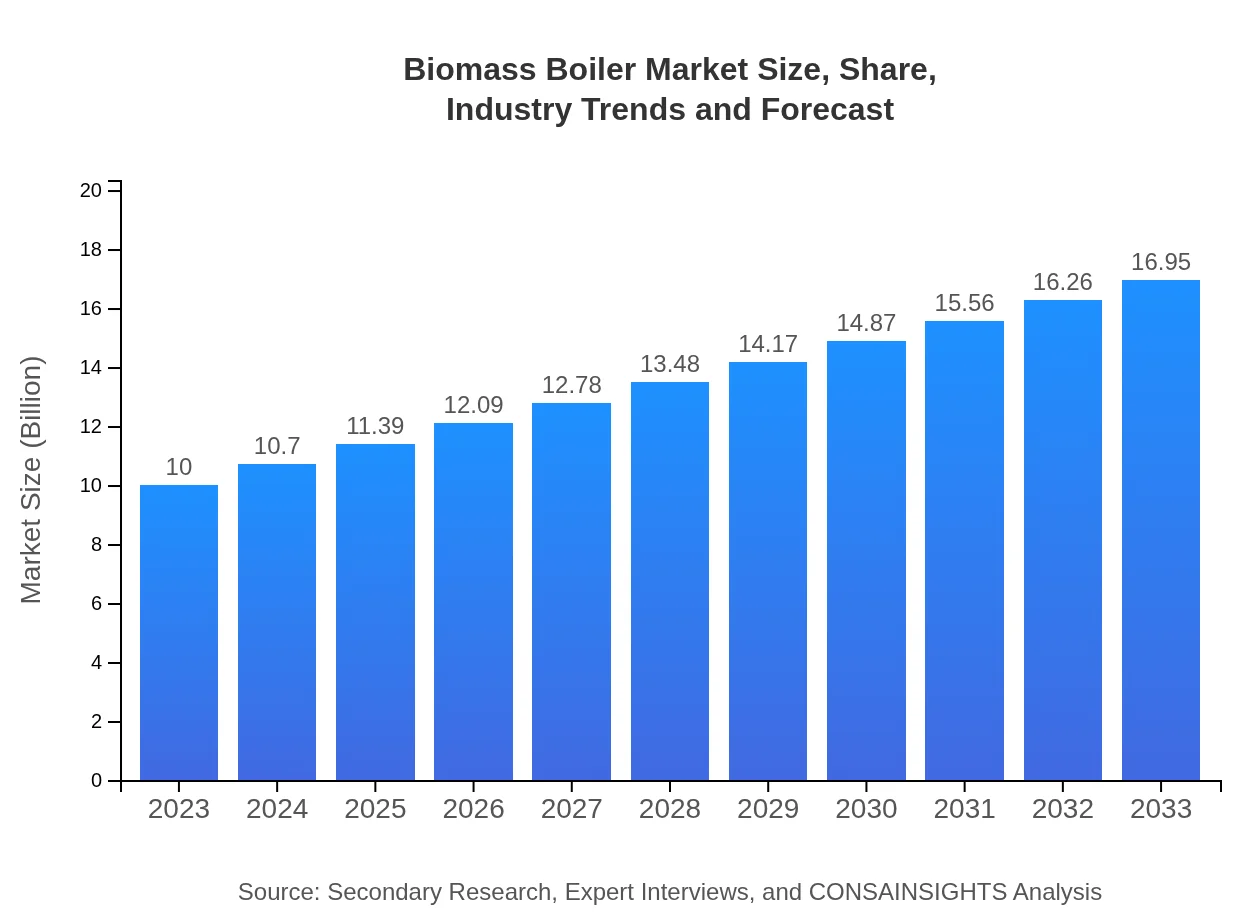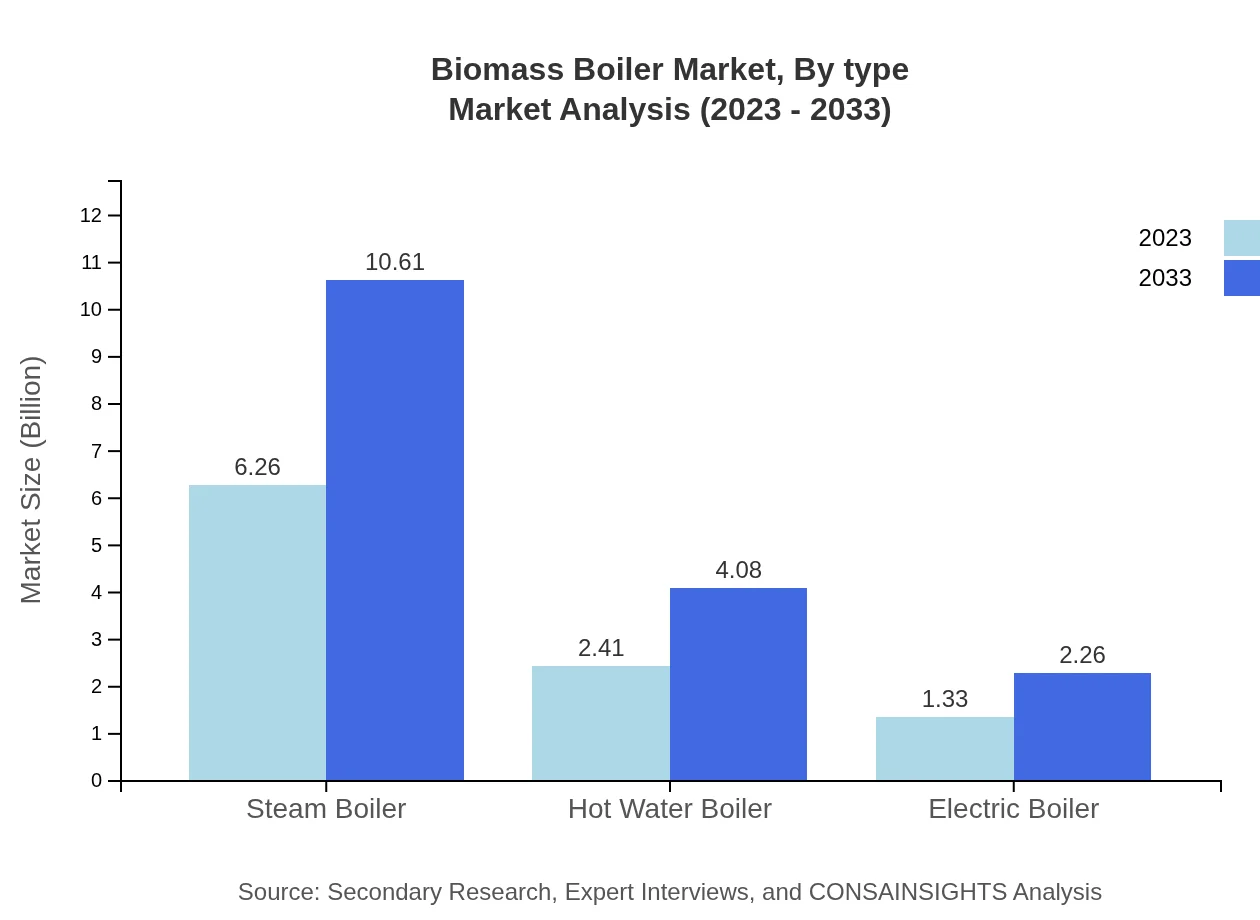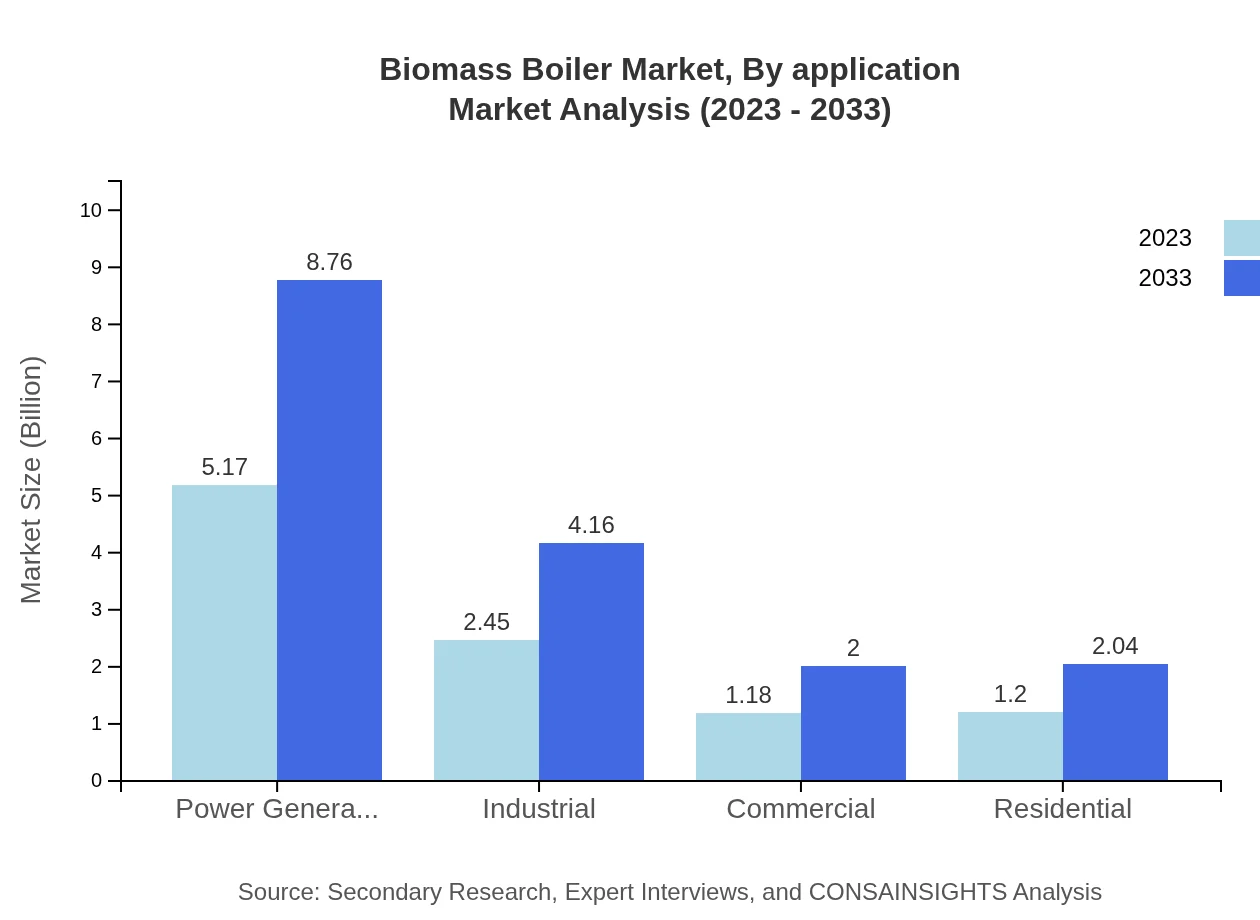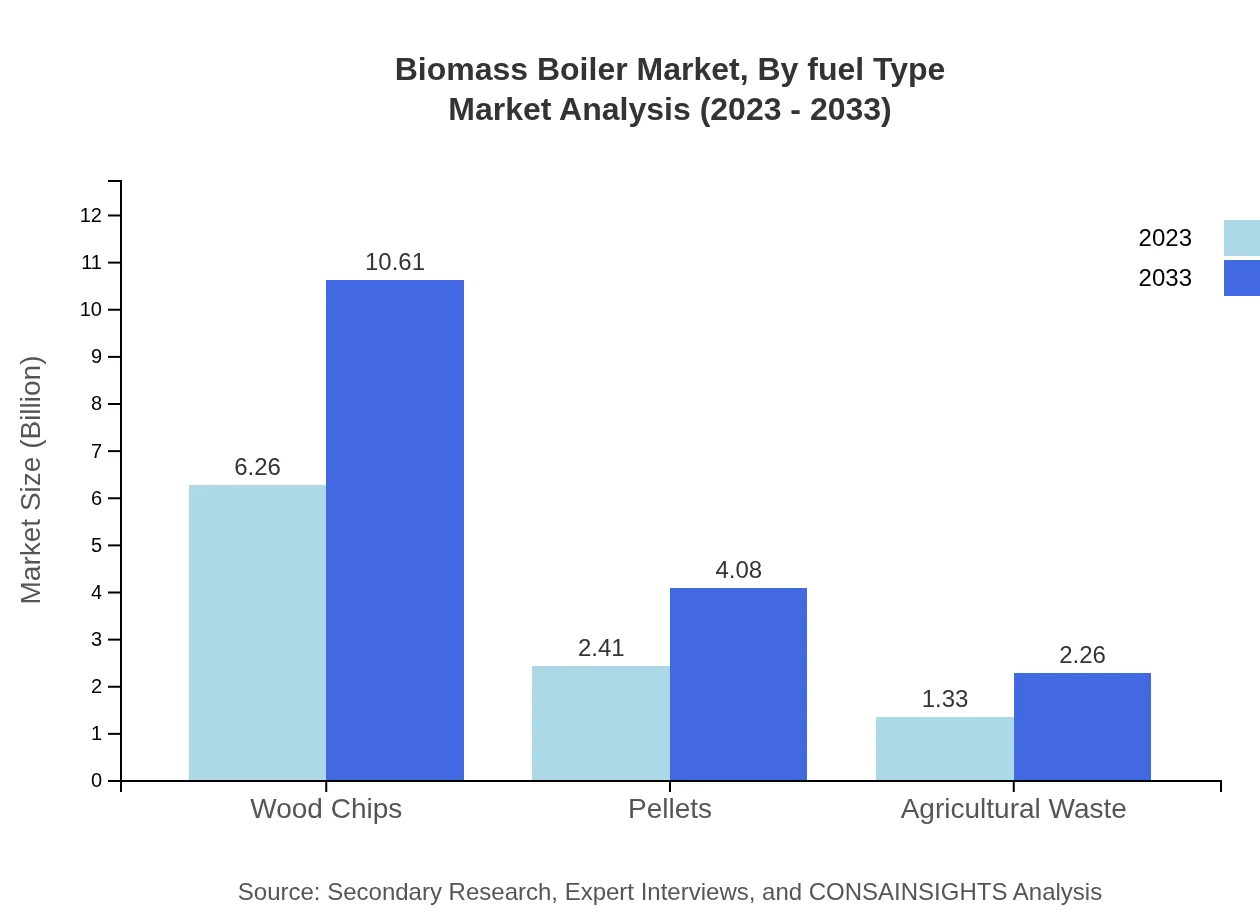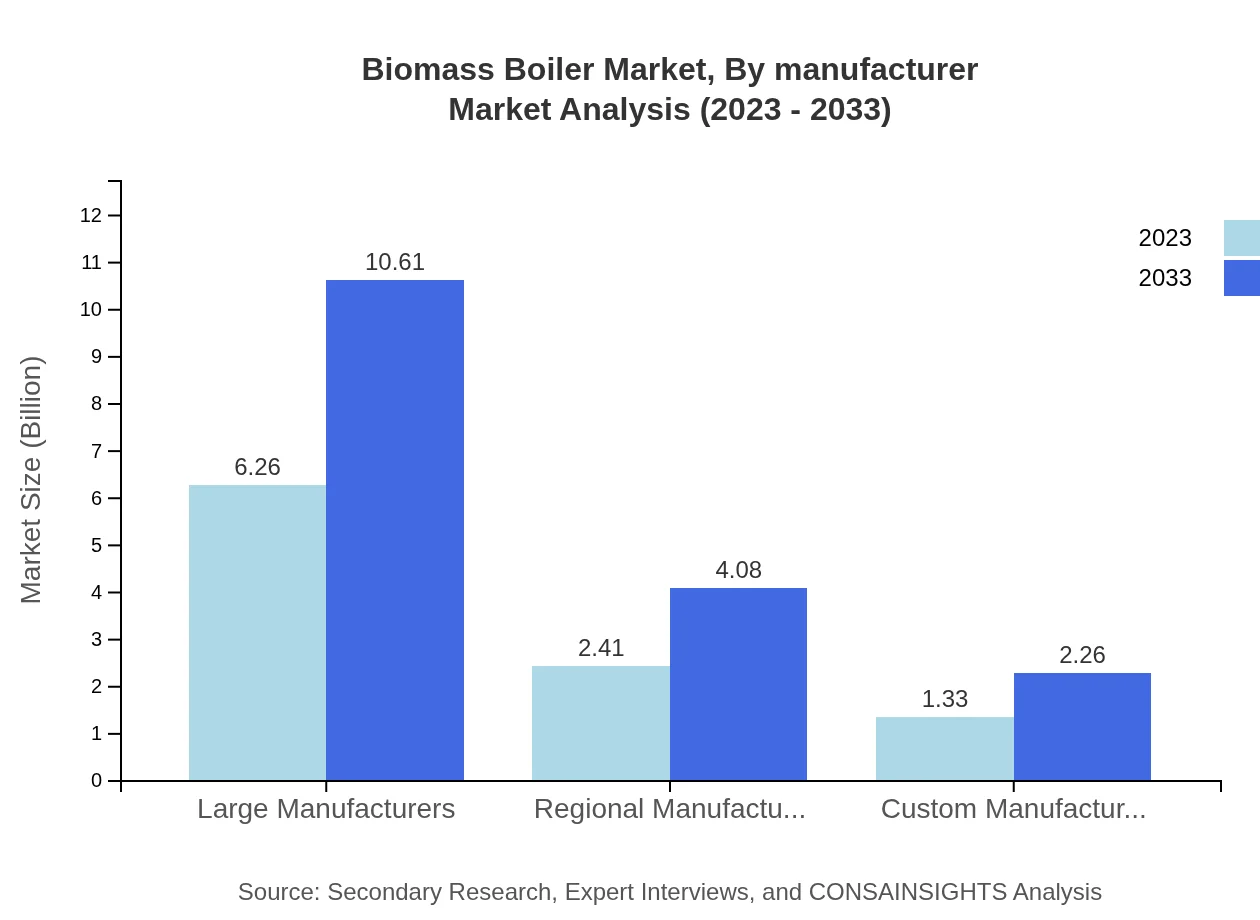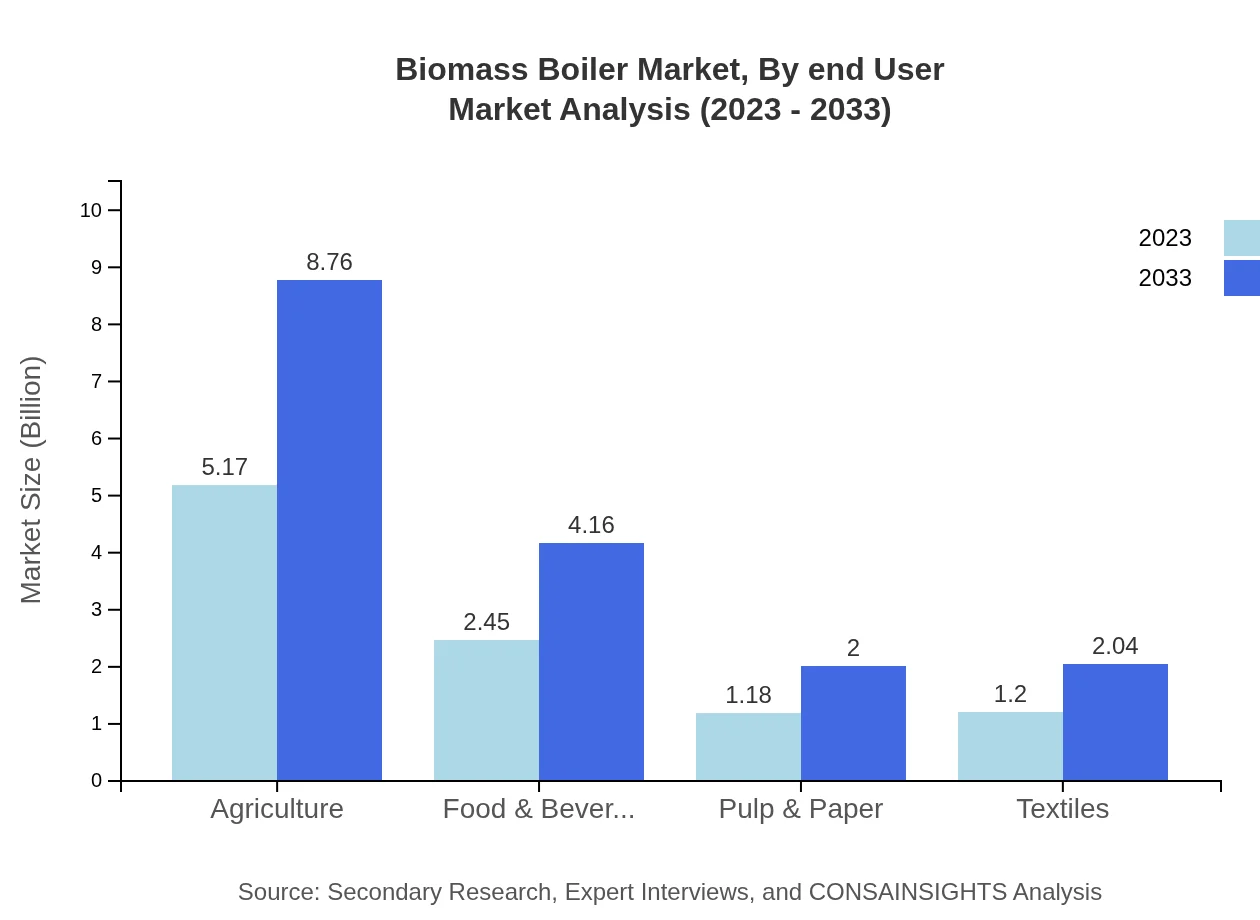Biomass Boiler Market Report
Published Date: 22 January 2026 | Report Code: biomass-boiler
Biomass Boiler Market Size, Share, Industry Trends and Forecast to 2033
This report provides a comprehensive analysis of the Biomass Boiler market, covering its size, segmentation, regional insights, and trends from 2023 to 2033, alongside forecasting future growth opportunities and challenges.
| Metric | Value |
|---|---|
| Study Period | 2023 - 2033 |
| 2023 Market Size | $10.00 Billion |
| CAGR (2023-2033) | 5.3% |
| 2033 Market Size | $16.95 Billion |
| Top Companies | Andritz AG, Froling Energy, Bosch Thermotechnology, Hurst Boiler & Welding Company, Viessmann Group |
| Last Modified Date | 22 January 2026 |
Biomass Boiler Market Overview
Customize Biomass Boiler Market Report market research report
- ✔ Get in-depth analysis of Biomass Boiler market size, growth, and forecasts.
- ✔ Understand Biomass Boiler's regional dynamics and industry-specific trends.
- ✔ Identify potential applications, end-user demand, and growth segments in Biomass Boiler
What is the Market Size & CAGR of Biomass Boiler market in 2033?
Biomass Boiler Industry Analysis
Biomass Boiler Market Segmentation and Scope
Tell us your focus area and get a customized research report.
Biomass Boiler Market Analysis Report by Region
Europe Biomass Boiler Market Report:
In Europe, the Biomass Boiler market is forecasted to grow from USD 2.40 billion in 2023 to USD 4.07 billion by 2033. European nations are leading the way in biomass technology adoption, supported by favorable policies and funding initiatives aimed at reducing carbon footprints.Asia Pacific Biomass Boiler Market Report:
In the Asia Pacific region, the Biomass Boiler market is expected to grow from USD 1.99 billion in 2023 to USD 3.38 billion by 2033. Rapid industrialization and growing energy needs, combined with supportive government policies towards renewable energy, are propelling this growth. Countries like India and China are investing significantly in biomass energy infrastructure.North America Biomass Boiler Market Report:
North America's Biomass Boiler market is expected to expand from USD 3.42 billion in 2023 to USD 5.80 billion by 2033. This growth is attributed to stringent environmental regulations encouraging the use of cleaner technologies, alongside a robust support system for biomass projects.South America Biomass Boiler Market Report:
The South America market for Biomass Boilers is projected to increase from USD 0.91 billion in 2023 to USD 1.54 billion in 2033. This growth is driven by the agricultural sector's demand for heating solutions and energy generation, particularly in Brazil and Argentina, where bioenergy initiatives are on the rise.Middle East & Africa Biomass Boiler Market Report:
The Middle East and Africa Biomass Boiler market is anticipated to grow from USD 1.27 billion in 2023 to USD 2.16 billion by 2033. This growth is stimulated by rising energy consumption and increasing government focus on renewable energy diversification, particularly in countries like South Africa and Kenya.Tell us your focus area and get a customized research report.
Biomass Boiler Market Analysis By Type
The Biomass Boiler Market can be classified into three primary types: steam boilers, hot water boilers, and electric boilers. The steam boiler segment represents the largest market share, accounting for USD 6.26 billion in 2023, projected to grow to USD 10.61 billion by 2033. The hot water boiler segment follows, starting at USD 2.41 billion and reaching USD 4.08 billion. Electric boilers, less prominent, are expected to grow from USD 1.33 billion to USD 2.26 billion during this period.
Biomass Boiler Market Analysis By Application
Applications of Biomass Boilers encompass sectors such as agriculture, food & beverage, pulp & paper, textiles, and power generation. The agricultural sector leads the market, beginning at USD 5.17 billion and predicted to reach USD 8.76 billion by 2033, supported by steady energy requirements. Other notable sectors include industrial uses, which are expected to grow from USD 2.45 billion to USD 4.16 billion, showcasing a strong dependence on biomass for energy.
Biomass Boiler Market Analysis By Fuel Type
The market is further segmented by fuel types, predominantly wood chips, pellets, agricultural waste, and others. Wood chips lead significantly, with a market size of USD 6.26 billion in 2023, projected to grow to USD 10.61 billion. Pellets also represent a substantial share, growing from USD 2.41 billion to USD 4.08 billion, indicating strong adoption across various applications.
Biomass Boiler Market Analysis By Manufacturer
Manufacturers in the Biomass Boiler market can be categorized into large manufacturers, regional manufacturers, and custom manufacturers. Large manufacturers dominate with a market share starting at USD 6.26 billion, while regional manufacturers begin at USD 2.41 billion, and custom manufacturers at USD 1.33 billion. The trend reflects a growing emphasis on tailored solutions to meet specific regional energy demands.
Biomass Boiler Market Analysis By End User
The end-user segment includes residential, commercial, industrial, and agricultural uses. Residential demand is expected to grow from USD 1.20 billion in 2023 to USD 2.04 billion, while industrial applications are projected to expand from USD 2.45 billion to USD 4.16 billion. Commercial uses show steady demand, highlighting a comprehensive integration of biomass solutions across various sectors.
Biomass Boiler Market Trends and Future Forecast
Tell us your focus area and get a customized research report.
Global Market Leaders and Top Companies in Biomass Boiler Industry
Andritz AG:
A leading global supplier of plants, equipment, and services for biomass boiler solutions, Andritz AG specializes in advanced technologies for converting biomass into energy, facilitating sustainable energy development.Froling Energy:
A prominent provider of biomass heating systems, particularly known for their efficient wood chip and pellet boilers that cater to residential and industrial markets.Bosch Thermotechnology:
Bosch offers a wide range of biomass boilers and heating systems, providing energy-efficient solutions with a focus on integrating renewable technologies.Hurst Boiler & Welding Company:
Specializes in the design and manufacturing of biomass-fired boilers, providing customized solutions for residential and commercial heating needs.Viessmann Group:
Known for innovative boiler technologies, Viessmann manufactures a diverse range of biomass heating systems, emphasizing sustainable and efficient energy solutions.We're grateful to work with incredible clients.









FAQs
What is the market size of biomass Boiler?
The biomass boiler market is currently valued at approximately $10 billion in 2023, with an expected compound annual growth rate (CAGR) of 5.3%. By 2033, the market size is projected to increase significantly, emphasizing strong growth in this sector.
What are the key market players or companies in this biomass Boiler industry?
Key players in the biomass boiler industry include large manufacturers and regional manufacturers specializing in energy solutions. These companies are pivotal in driving innovation and providing sustainable energy alternatives.
What are the primary factors driving the growth in the biomass boiler industry?
Growth in the biomass boiler industry is driven by increasing demand for renewable energy sources, government initiatives supporting green technology, and a growing focus on reducing carbon emissions and fossil fuel dependency.
Which region is the fastest Growing in the biomass boiler market?
Asia Pacific is the fastest-growing region in the biomass boiler market, with a projected increase from $1.99 billion in 2023 to $3.38 billion by 2033, reflecting robust growth in renewable energy adoption in this area.
Does ConsaInsights provide customized market report data for the biomass boiler industry?
Yes, ConsaInsights offers customized market reports tailored to specific needs, providing in-depth analysis and actionable data for the biomass boiler industry to support business strategy and decision-making.
What deliverables can I expect from this biomass boiler market research project?
Deliverables from the biomass boiler market research project include comprehensive market analysis reports, segmentation data, regional assessments, and trend analysis, ensuring clients receive detailed insights for strategic planning.
What are the market trends of biomass boiler?
Current market trends in the biomass boiler sector include escalating interest in sustainable fuel sources, technological advancements in boiler efficiency, and enhancing penetration in various industrial applications, indicating a dynamic and evolving landscape.

